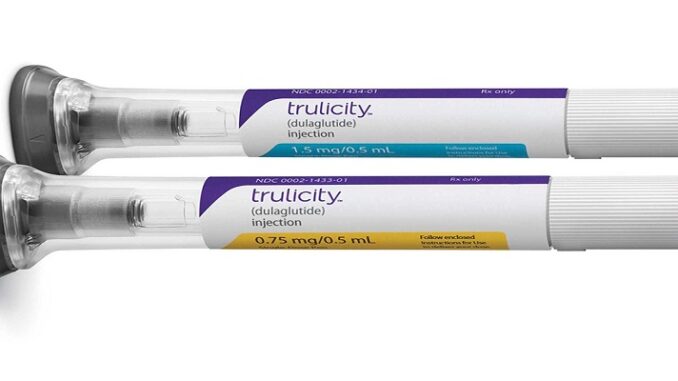
Latest news about Trulicity lawsuit: The FDA has approved Trulicity for several uses in adults with type 2 diabetes. Primarily, it is prescribed to improve blood sugar levels in conjunction with a proper diet and exercise regimen. Additionally, it is used to mitigate the risk of major cardiovascular events such as heart attacks and strokes, particularly in individuals who have cardiovascular disease or multiple risk factors for cardiovascular disease. Trulicity functions by turning on the GLP-1 receptor in your body, which increases insulin release from the pancreas when blood sugar levels are high. Unlike insulin, which directly lowers blood sugar by facilitating its uptake into cells, Trulicity works indirectly by affecting insulin secretion and delaying gastric emptying. This not only helps in controlling post-meal sugar spikes but also aids in weight management by making you feel fuller longer. Furthermore, it inhibits the release of glucagon, a hormone that raises blood sugar levels, thereby providing a comprehensive approach to managing type 2 diabetes. See more info at Trulicity lawsuit.
When you begin treatment with Trulicity, you may experience several gastrointestinal side effects, which are among the most commonly reported issues. Nausea is particularly prevalent, affecting about 1 in 5 users during clinical trials. It is most likely to occur when you first start the medication and can intensify when the dosage is increased. In clinical studies, nausea was experienced by 8% to 29% of participants, typically within the first few days after the initial dose. While it generally subsides after the first two weeks, some individuals may continue to feel nauseous beyond this period. Diarrhea and vomiting are also common, with up to 13.7% of users reporting diarrhea and 11.5% experiencing vomiting.
Trulicity has been linked to an elevated risk of thyroid tumors, including cancer, and gallbladder disease. Symptoms such as a lump in the neck, difficulty swallowing, or persistent hoarseness should prompt immediate consultation with healthcare providers. Additionally, gallbladder disease can manifest as severe abdominal pain and jaundice, demanding prompt medical evaluation to prevent life-threatening complications. Beyond the aforementioned issues, Trulicity usage has been associated with other severe reactions including allergic responses, kidney damage, and vision changes. Severe allergic reactions may include swelling of the face, difficulty breathing, or severe skin rashes, all of which require immediate medical attention. The drug’s effect on kidney function can vary from mild impairment to complete organ failure, emphasizing the importance of monitoring and early intervention.
Trulicity is a once-a-week injectable medicine that can be used as a first-line medication to improve blood sugar control in adults over the age of 18 with type-2 diabetes. It works by mimicking the effects of GLP-1, a naturally occurring hormone that stimulates insulin secretion and lowers glucagon secretion from the liver. Additionally, Trulicity, while a diabetes medication that is not U.S. Food and Drug Administration (FDA) approved for weight loss, is often sometimes prescribed off-label for weight management.
Common Trulicity side effects include diarrhea, frequent bowel movements, nausea, and retching. Other side effects include abdominal distress, abdominal pain, abdominal tenderness, asthenia, dyspepsia, fatigue, gastrointestinal pain, lower abdominal pain, upper abdominal pain, decreased appetite, and malaise.
Numerous reports and studies have suggested a strong association between Trulicity and persistent vomiting. This side effect can be debilitating and significantly impact the quality of life for individuals taking Trulicity. Persistent vomiting refers to continuous and uncontrollable bouts of vomiting that occur for an extended period, requiring trips to the emergency room. The exact mechanism by which Trulicity triggers this reaction is still being studied, but it is believed to be related to the drug’s effect on the gastrointestinal system.
If you took Trulicity and were diagnosed with gastroparesis, gallbladder disease, kidney disease, intestinal blockages, suffered Trulicity and persistent vomiting, or any other serious Trulicity side effects, contact Timothy L. Miles, a Trulicity lawyer in Nashville today. ?You may be eligible for a Trulicity Lawsuit ?and possibly may be entitled to substantial compensation. Discover even more information at https://www.dangerousdrugslawyertn.com/trulicity.html.
Another common allegation in the Trulicity lawsuits is the breach of warranty. Plaintiffs argue that Eli Lilly implicitly warranted that Trulicity was safe and effective for managing diabetes when, in fact, the drug was associated with severe adverse effects that were not sufficiently disclosed. This claim is supported by assertions that the promotional materials and labeling by Eli Lilly conveyed assurances of safety and efficacy, which were allegedly misleading given the undisclosed serious risks.